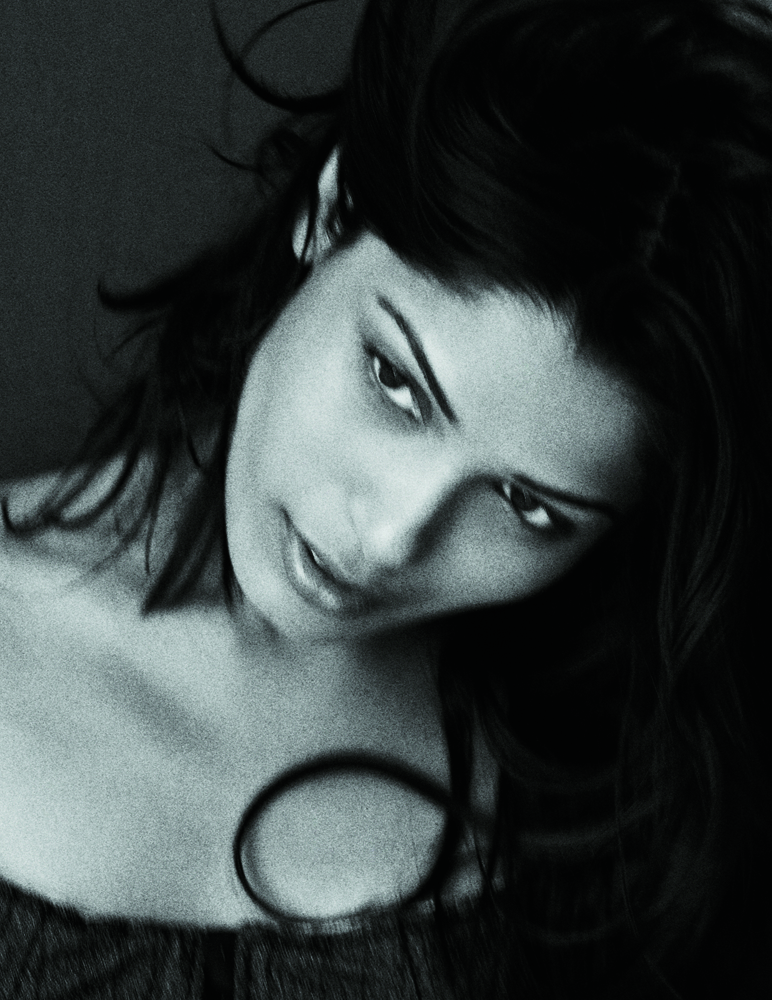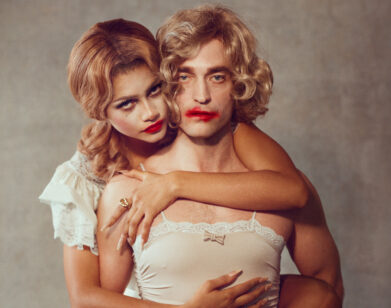Freida Pinto
Freida Pinto’s story reads like an old Hollywood invention gone global: In 2007, director Danny Boyle cast her to play the female lead in Slumdog Millionaire, a tragicomic romance set on the streets of Mumbai that fought the odds and scrapped its way to win best picture at the Oscars. For Pinto, the fallout has been similarly meteoric: Before Slumdog, the 25-year-old Mumbai native Pinto-a former model who, at the time of the film’s casting, had just finished hosting an Indian travel show-had admittedly almost quit the business because she couldn’t get a foothold. But things seem to have changed for her at lightning speed. In Woody Allen’s You Will Meet a Tall Dark Stranger, a meditation on martial dissatisfaction, released earlier this fall, she played a foxy music student who has an affair with a married and struggling writer (Josh Brolin). In March, she stars as the title character in Julian Schnabel’s already controversial Miral, which tells the story of a Palestinian girl torn between organized resistance and her own education. And next fall she plays a soothsayer in Immortals, director Tarsem Singh’s sex-sandals-and-CGI take on Greek mythology. When we spoke, Pinto was in Canada shooting Caesar: Rise of the Apes, a prequel to Planet of the Apes (scheduled for release in June 2011), alongside James Franco. In the film, she plays a primatologist who gets to meditate on the ethics of animal testing and be romanced by Franco. Although she wouldn’t discuss the latter, she did hold forth on her Slumdog co-star (and boyfriend) Dev Patel, Miral, and her multifarious career strategy.

MICHAEL MARTIN: How would you describe the past few years?
FREIDA PINTO: I end up laughing about it. You always dream of something magical happening, and when it happens to you, it’s almost difficult to accept that it actually happened. At the same time, you can’t take yourself too bloody seriously in life, otherwise you’re going to dig your own grave. Everybody comes up with this term lucky-“Oh, she’s so lucky.” Even though I was lucky, I had a lot of struggle before that. I said I was going to give up everything at age 25 and get into event management because nothing was going for me. I used to have a lot of nervous breakdowns.
MARTIN: You went on a lot of auditions before Slumdog, and you weren’t getting anywhere. How did you push through that?
PINTO: I’m glad things happened the way they happened. I needed to be rejected, and I needed to learn that it’s part of the game. I said, “It’s okay. I can have 100 rejections, but I’m sure there’s going to be one particular thing that is almost destined for me to have, and I am going to have it.” Some of those things I got rejected for, I look back and say, “Oh, my god, I’m so happy that happened.” There would be a lot of things I would have regretted.
MARTIN: Like what?
PINTO: Like sports-cream commercials. [laughs] I used to go for these crazy auditions and they’d have the most stupid, silly scripts. My heart was never in it. I would go and try to do what I could, and then a short list would come out. Every day I was on the short list I would have a bad day-I’d be very moody and on edge. At the same time, I thought, “What would happen if I made it to the final list? Maybe that would be my ticket.” But deep down in my heart I always had doubts, and I think when you have doubts, you just say no.
I’m glad I’m a strong person . . . I haven’t had to compromise in any way . . . it’s not that difficult to say no when you don’t want to do something.Freida Pinto
MARTIN: How do you feel about all the focus on your looks?
PINTO: There’s no other way of dealing with it because there are so many people giving you so many opinions about how you look. It’s hard for me to gauge what people are sometimes getting at. This brings up my suspicious side. I feel you just have to be confident with yourself. I feel topics like, “Oh, she looks beautiful today” or “She looks a mess today without her makeup”-that’s always going to come my way, so I just think it’s all about self-confidence.
MARTIN: Has Hollywood tried to remold you?
PINTO: I’m glad I’m a strong person. In that sense, I haven’t had to compromise in any way. So far I haven’t experienced it, and I hope I will not experience it. It’s not that difficult to say no when you don’t want to do something.
MARTIN: What was it like working with Woody Allen?
PINTO: He actually leaves his actors to their own devices. As a director, he says, “I don’t want an actor coming to set who feels the need to start acting all of a sudden. When you’re talking to me in this room, everything is organic, everything is natural.” That’s what he wants on set-to get the idea right and just take it from there, rather than overanalyzing things. That was good advice he gave me, just to be very visceral.
If sir ben kingsley can play gandhi, anyone from anywhere—as long as they understand the essence of the character and the emotions of the character—can be or play anything.Freida Pinto
MARTIN: The film’s take on relationships isn’t the most hopeful message.
PINTO: It’s not savory, in a way, but I feel that it’s so true: As the world’s getting filled with temptations, we’re getting a bit frivolous and a bit fickle. The problem with my character is that she has no idea what she wants out of life-she’s all over the place. I think being aware of yourself is very important to getting over that syndrome. It’s a lot of work, but it’s possible.
MARTIN: How did you get involved with Miral?
PINTO: That was a process of auditions. I read the script in December 2008. I fell in love with the story and felt that it had to be told. Danny Boyle knew I was excited about this project and he put me on tape for that audition because he is just a wonderful man. It was Danny’s audition as well. He played the role of the police officer. Danny can play scary parts well. He can really instill fear in you.
MARTIN: Did working on Miral change your political opinions?
PINTO: I didn’t know too much about the history or politics of Israel and Palestine. Everything that I knew was from books I read and the newspaper. Having read that script, I realized there was a universal theme running through the film that could be applicable to women all over the world. It’s the desire to be free to do whatever you want in any aspect of life, whether it’s love or education or just choosing where you want to live.
MARTIN: How concerned were you with being believable as a Palestinian?
PINTO: This is what I always say: If Sir Ben Kingsley can play Gandhi, anyone from anywhere-as long as they understand the essence of the character and the emotions of the character-can be or play anything. This whole thing about race-I understand that sometimes you need to be true to the ethnicity or the country the person comes from, but I feel like an Indian can easily play a Palestinian, or the other way around. It’s a culture where people have a very dynamic kind of a look-they look very Middle Eastern. I see people who look very Asian as well. There’s a bit of the African culture injected into that too. I wasn’t worried about how my character looked-I was worried about getting the emotions bang-on.
MARTIN: Could you relate to Miral’s political struggle?
PINTO: I feel like the history between Israel and Palestine has a lot in common with the history between India and Pakistan. Anybody, anywhere in the world, all they want is to be free, to choose what they want to do without having someone tell them how to do it. When that is taken away from you-when you have to be a prisoner in your own land-it’s absolutely disconcerting. I’ve not experienced that in India, because my country has given me everything quite openly and quite freely, and I have a family that has never restricted me from doing anything that I’ve wanted. But to feel that that could be taken away from me one day by a certain power up there in the government that I have no control over-that I would have to just bow down in front of-thinking about that makes me feel very helpless and angry.
MARTIN: Tell me about Immortals-your first big-budget film.
PINTO: What an exciting project. It was very interesting when I learned that the men were going to be objectified and the women could just enjoy themselves. I was excited about doing a project where I was all covered but the men had these tiny miniskirts on. Sometimes the skirt was almost not there! The director, Tarsem Singh, is a visualist-his mind is almost like a child’s imagination. He brings to life what some people can only imagine. The movie was shot using a green screen, which made me nervous at first, but then I realized you just have to let your imagination flow.
MARTIN: Who’s your character?
PINTO: I play this oracle priestess, Phaedra. She can see the future, but she never knows if what she sees in the vision is how it’s going to turn out. It’s having this superpower, but also being very human in a way.
MARTIN: Where are you based?
PINTO: I’d like to say I live somewhere, but right now I’m all over the world with my three suitcases that I’ve been carrying with me for two years. I just keep changing the clothes in the bags. Literally, I have no fixed address. I call Bombay my home, but I moved to London a bit last year when I was doing the Woody Allen film, and I loved that as my second home. I love New York as well.
MARTIN: Are you and Dev Patel still seeing each other?
PINTO: Yes . . . I find it very hard to say yes or no quite openly, because people are never satisfied. One day they write us off as saying we’re not together and the next day we’re together and getting married. It’s so bizarre and stupid. I don’t want to feed stupidity with more stupidity. I just let it be.
MARTIN: What do you do in your spare time?
PINTO: I’ve been finding a lot of peace doing yoga and meditation. I’m reading this very interesting book called White Mughals by William Dalrymple. And next month, when I go back to India, I’m going to learn to swim. I’m so lousy at it. When I was shooting Miral, my sister and her friend came down and we went to the Dead Sea. The lifeguard yelled at me because apparently I was splashing salt water into everybody’s eyes. He asked me to get out of the water.
MARTIN: You got kicked out of the Dead Sea.
PINTO: I got kicked out of the Dead Sea. You can’t really drown in it, but it scared the life out of me. I said, “There’s no way I can continue living like this.” It’s just something I want to get over.
MARTIN: What kind of career do you envision for yourself?
PINTO: A career that is not stereotyped at any point in time. That tends to happen to people coming from various ethnicities. So far I’ve had a great run, and I’m wishing to continue that. I aspire to continue until I die-I tell my mom that all the time-just keep making films and entertaining people.
Michael Martin is a contributing editor to Interview.







